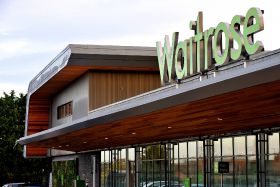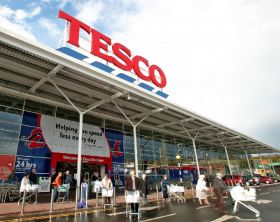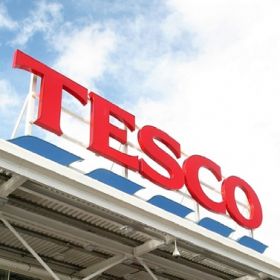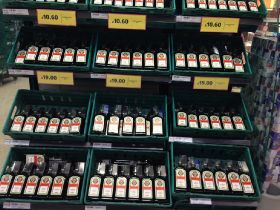Retailer news
Premium store and the discounters grow sales and market share at a time when like-for-like prices are down
There was further evidence that the two ends of the grocery market are where the action is with the release of new figures showing strong sales for Waitrose, Aldi and Lidl.
Waitrose was the big winner in the latest Kantar Worldpanel figures, securing a record 5.2% market share on the back of 6.8% growth in the past year. The company has now grown its sales every month since March 2009.
At the other end of the price spectrum, Aldi’s growth might have slowed slightly, but it still recorded a 27% increase versus last year, leaving it with a 4.8% market share.
Fellow German discounter Lidl’s share hit 3.5% after an 18% sales rise.

“We are seeing clear polarisation of the market with both the premium and discount ends of the market gaining share, while the mainstream grocers continue to be squeezed in the middle,” said Kantar’s head of retail and consumer insight, Fraser McKevitt.
Among the big four, Asda continued its form by growing sales ahead of the market – up 1% over the year, compared to like-for-like overall market decline of 0.2% – and boosting its share to 17.3%.
All eyes are on Tesco after its recent struggles. Its sales show a 3.6% decrease, but that at least represents its best figure since June.
Both Sainsbury’s and Morrisons’ sales slipped, by 3.1% and 1.8% respectively.
Richard Cousins and Mikael Ohlsson will join the board of the beleaguered retailer on 1 November 2014
Tesco has appointed two new non-exec directors.
Richard Cousins and Mikael Ohlsson will join the board of the controversy-mired retailer on 1 November 2014 as non-exec Directors.

Cousins has been group CEO of Compass Group PLC since 2006. He was a non-exec director of Reckitt Benckiser Group PLC from 2009 until May 2014, and also held the same role at HBOS PLC and Bank of Scotland from 2007 to 2009.
Ohlsson, meanwhile, was CEO and president of the IKEA Group until September 2013.
He is currently a non-exec director of Volvo Car Corporation, Ikano SA and Lindengruppen.
Sir Richard Broadbent, Tesco chairman, said: “I am delighted to welcome Mikael and Richard to the board, and know that their broad skills and experience will be a real asset to the company in the coming years.
“Mikael and Richard have been updated on and are wholly supportive of the steps being taken by the new management team to rebuild trust in Tesco and to focus all the resources of the business to deliver value to our customers.”
Retailer launches new price match scheme that compares with Aldi and Lidl as well as top four on branded and own-brand items
Morrisons has launched the first-ever price match scheme that compares with discounters Aldi and Lidl, as well as Tesco, Sainsbury’s and Asda.
The scheme, named ‘Match and More’, will refund any differences in price of comparable products as points onto cards, using price data from independent analysts Profitero.

The retailer said that if Lidl is 60 pence cheaper than Morrisons then 600 points are added to a shopper’s Match & More account.
It will launch as a phased roll-out starting today (3 October) and will be in stores in time for Christmas.
When 5,000 Match & More points are collected the customer receives a £5 voucher at the till, while shopper information from the cards will be collected and used to tailor future offers.
Morrisons CEO Dalton Philips said the retailer has learned from other price match programmes so customers will not collect lots of small vouchers or have to redeem them online when they get home.
“Because it price matches the discounters, the Match & More card will provide the ultimate guarantee about Morrisons’ value-for-money,” he said.
Morrisons said it also has plans to allow points to be redeemed as vouchers for leisure activities such as eating-out and travel.
Price matched products will cover branded and own-brand products as well as items that are on promotion elsewhere.
Ex-M&S finance officer Alan Stewart has joined troubled Tesco ahead of schedule following yesterday’s shock admission of £250m overstatement
Beleaguered retailer Tesco has parachuted its new chief financial officer into the role more than two months earlier than planned.

Alan Stewart, previously in the same post at Marks & Spencer, was due to join in December, to replace Laurie McIlwee who resigned in April.
According to the BBC, the move was at the personal request of Tesco chief executive Dave Lewis to his M&S counterpart Marc Bolland, who allowed Stewart to leave early.
Yesterday Tesco made the shock announcement that it had overstated its half-year profit forecast by £250 million, and suspended four of its senior executives.
Among those suspended are UK managing director Chris Bush, and GFS architect Matt Simister.
Analysts have said that the overstatement may have come from commercial income from suppliers that had been registered early in order to boost profits. It is not yet clear if contracts with fresh produce suppliers were involved in the issue.
Tesco has launched an independent investigation into the error, headed by Deloitte, and has said work is now ongoing to establish the effect on full-year results, due to be released on 23 October.
A Morrisons advert showed a burger as the ‘preferable option to the salad’ as girl removes salad, onions and tomato

Top four retailer Morrisons has been banned from showing a television advert for burgers that depicts a girl removing the salad, a watchdog has ruled.
The Advertising Standards Authority (ASA) said the advert “condoned poor nutritional habits” as the girl removes the salad, onion and tomato from the burger and leaves them on the side of her plate.
This “suggested she was not going to eat the salad later”, the ASA ruled.
“Because we considered the ad placed an emphasis on the burger being the preferable option to the salad, we concluded it condoned poor nutritional habits or an unhealthy lifestyle, especially in children, and that it disparaged good dietary practice,” said the ASA.
Morrisons’ representative at the hearing argued that “the daughter did not look disdainfully at the salad items” and that “it was perfectly feasible that she would return to it later”, the BBC reported.
A Tesco store near to the Reading Festival has filled its fruit and veg aisles with cider and spirits ready for ‘biggest weekend’ of year.

Tesco has replaced fruit and vegetable aisles with booze in one of its stores to cater for festival-goers in the run-up to Reading Festival.
The Tesco Extra store, 10 minutes away from the event in Reading, has placed bottles of Jagermeister and vodka in fresh produce pallets. It has also filled whole aisles with crates of strongbow cider.
Local business Warings Bakery tweeted pictures of the supermarket shelves with the caption: “Our local Tesco have ditched salad for spirits ready for RDG festival.”
The store also has a dedicated ‘festival shop’ area for the weekend and will be playing music and holding events from tomorrow onwards.
A Tesco spokesperson told the Mirror newspaper that this weekend is the biggest of the year for the Reading West store, even beating Christmas, and managers work hard to make sure festival-goers can buy everything they need.
“During the festival we expect to see 35,000 people a day coming through the store, and yes, we expect some of them will want to buy alcohol,” the spokesperson said.
Retailer completes sale of former logistics hub after moving operations to M1 site in 18-month major logistics overhaul.
The Co-operative Estates has completed the sale of its former East Midlands regional distribution centre (RDC) to a logistics company.

The RDC, at Blenheim Industrial Estate, Nottingham, has been sold to logistics firm Great Bear Distribution, which plans to use it for storage and distribution.
The 208,000 sq ft warehouse was closed as part of The Co-operative’s restructuring of its national distribution network. Operations have been consolidated into a new 500,000 sq ft RDC at Castlewood, at junction 28 on the M1.
The sale included an adjacent vehicle maintenance unit of 7,600 sq ft, with both the areas covering around nine acres.
“The lack of speculative development in recent years now means that demand for large industrial units outweighs supply which has aided the sale,” said Geoff Player, director of commercial and investment property with The Co-operative Estates.
Player said it is the company’s tenth major industrial property transaction since it began restructuring its UK warehouses 18 months ago.
David Willmer, senior director at GVA, who acted on behalf of The Co-operative Estates, said: “The quality of the unit, together with its excellent accessibility to the motorway network, ensured that strong interest was received from both potential occupiers and investors.”
Results of a survey by Ethical Consumer readers come after scandal surrounding Paul Flowers, group’s ex-chairman
The Co-operative Group has been voted the most ethical company in the UK over the last 25 years.

The results of a survey by the readers of the Ethical Consumer magazine come shortly after a scandal surrounding Paul Flowers, the group’s former chairman, who pleaded guilty to the charge of possessing cocaine in May.
It also revealed losses of £2.5 billion for the financial year ending April 2014
Ethical Consumer co-director Tim Hunt, said: “Many commentators have had their knives out for The Co-op Group in recent months. Ethical Consumer’s readers, however, are able to see through the spin and realise that despite the problems, The Co-op remains an ethical business at heart – at least for the time being.”
In order to generate capital, The Co-op Group has sold its farm business to the Welcome Trust for £249 millions.
Peter Pereira Gray, managing director of investments at the Wellcome Trust, said: “The Co-operative has its own form of ethics. We wouldn’t necessarily seek to be exactly replicating theirs. We have our own very high standards.”
Sainsbury’s has announced new technology for its sheep farmers, which will “effectively manage parasites, increasing product quality”.

The parasite management technology, Fecpak, allows farmers real-time feedback on parasites, as opposed to sending samples away for testing, which can take time, thus allowing for more regular testing. The technology is being supplied by New Zealand company Techion Group.
According to Techion, after nutrition, parasites are the largest influencing factor on animal performance. “The problem of increasing drug resistance from parasites to the drenches designed to kill them means we have to be smarter on how and when we use them, so it’s important to make use of new technologies to make better decisions,” explained Greg Mirams, founder and managing director of Techion.
The supermarket has already piloted the technology with its sheep farmers. Gareth Owen, a Leicestershire sheep farmer who has been testing the system since December, said “Fecpak is user-friendly and puts accurate information at our fingertips, so we can make decisions sooner on whether we need to drench or not.”

Sainsbury’s is supporting the project through its Agricultural R&D Grant Scheme. Philip Hambling, agriculture manager for lamb and pork at Sainsbury’s, said: “We are delighted to support this project as it makes egg-counting more reliable. More frequent counting will give our farmers the power to make informed decisions that benefit the performance of the flock and make more effective use of anthelmintics.”